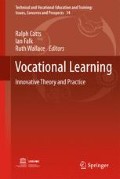Abstract
Self-perception is about how we see and value ourselves. It is also about how we see and value the people and events around us, and in turn, how we believe the outside world sees and values us. As a consequence, self-perception is a major determinant of our goals and ambitions, and our beliefs regarding our capacity to achieve them. This chapter considers the findings of three studies that consider the issues and concepts relating to self-perception that impact on vocational learning. The first study, by Misko, Beddie and Smith, provides evidence that, unless people perceive themselves to be competent learners, they generally will not seek to access formal vocational programmes. The second study, by Margaret Kling, reports on a series of exploratory discussions with seven adult learners, seeking their insights into the impact of self-perception on their learning processes and outcomes. Study three, by Smith and Clayton, highlights the potentially critical role that reflection may play in developing self-perception as a learner, and in turn, in improving learning performance.
Access this chapter
Tax calculation will be finalised at checkout
Purchases are for personal use only
References
Arscott, J., Crowther, I., Young, M., & Ungarian, L. (2007). Producing results in prior learning: A report from the Gateways Project. Retrieved December 10, 2007, from <gateways.athabascau.ca/media/FINALreport.pdf>
Bateman, A., & Knight, B. (2003). Giving credit: A review of RPL and credit transfer in the vocational education and training sector, 1995 to 2001. Adelaide: NCVER.
Bauer, J., Festner, D., Gruber, H., Harteis, C., & Heid, H. (2004). Do epistemic beliefs affect workplace learning? Journal for Workplace Learning, 16, 284–292.
Blom, K., Clayton, B., Bateman, A., Bedggood, M., & Hughes, E. (2004). RPL in enterprise-based RTOs: How does it work? Paper presented at 7th annual AVETRA conference, Canberra March 17–19, 2004. Retrieved August 9, 2007, from <http://www.avetra.org.au/Conference_Archives/2004/documents/PA057Bedggood.pdf>
Borg, W., & Gall, M. (1989). Educational research. New York: Longman.
Bowman, K., Clayton, B., Bateman, A., Knight, B., Thomson, P., Hargreaves, J., et al. (2003). Recognition of prior learning in the vocational education and training sector. Adelaide: NCVER.
Brubaker, R., & Cooper, F. (2000). Beyond ‘identity’. Theory and Society, 29, 1–47.
Chan, K. (2002). Students’ epistemological beliefs and approaches to learning. Paper presented at the AARE2002 conference held at Brisbane, Australia from December 1–5, 2002.
Creswell, J. (2005). Educational research: Planning, conducting and evaluating quantitative and qualitative research. Columbus, OH: Pearson.
Forte, R. F. (2007). A review of social identity theory with implications for training and development. Journal of European Industrial Training, 31(3), 166–180.
Gilovich, T., Keltner, D., & Nisbett, R. (2006). Social psychology. New York: Norton.
Hager, P. (1998). Lifelong education: From conflict to consensus? Studies in Philosophy and Education, 17(4), 323–332.
Hoyle, R. H. (1995). Structural equation modelling: Concepts, issues and applications. Thousand Oaks: Sage.
Illeris, R. (2003). Workplace learning and learning theory. Journal of Workplace Learning, 15(4), 167–178.
Kling, M. (2004). Recurrent issues in learning: The affect on the future development of adults. Paper presented at the 3rd Asia-Pacific conference on diversity and equity in continuing $education and lifelong learning, Perth, WA: Curtin University.
Knowles, M. (1990). The adult learner: A neglected species (3rd ed.). Houston: Gulf Publishing.
Laird, J. D. (2007). Feeling: The perception of self. Oxford: Oxford University Press.
Leedy, P. D., & Ormond, J. E. (2005). Practical research: Planning and design (8th ed.). New Jersey: Pearson Education.
Livingstone, D. (2000). Exploring the icebergs of adult learning: Findings of the first Canadian survey of informal learning practices. NALL Working Paper #10, The Research Network for New Approaches to Lifelong Learning. Retrieved November 6, 2007, from <http://www.oise.utoronto.ca/depts/sese/csew/nall/res/10exploring.htm>
Merriam, S., & Brockett, R. (1997). The adult learner and concepts of learning: The profession and practice of adult education. San Francisco: Jossey-bass.
Minichiello, V., Aroni, R., & Hays, T. (2008). In-depth interviewing (3rd ed.). New York: Pearson/Prentice Hall.
Misko, J., Beddie, F., & Smith, L. (2007). The recognition of non-formal and informal learning in Australia: Country background report prepared for the OECD activity on recognition of non-formal and informal learning. Canberra: Department of Education, Science and Training.
Pratt, M. G. (2003). Disentangling collective identities. In J. T. Polzer (Ed.), Identity issues in groups (pp. 161–88). Amsterdam: Elsevier Science.
Raelin, J. (2008). Work-based learning. New York: Jossy Bass/Wiley.
Ryckmann, R. M. (1993). Theories of personality (5th ed.). Pacific Grove, CA: Brooks-Cole Publishing.
Schon, D. (1983). The reflective practitioner: How professionals think in action. New York: Basic Books.
Smith, L., & Clayton, B. (2009). Recognising non-formal and informal learning: Participant insights and perspectives. Adelaide: NCVER.
Van Kleef, J. (2007). Strengthening PLAR: Integrating theory and practice in post-secondary education. Journal of Applied Research, 1(2), 1–22. September 2007, Retrieved October 14, 2007, from <http://www.ccl-cca.ca/NR/rdonlyres/BEE4E097-4DF8-4960-8779-F4EA6D0CE52A/0/JARLArticle5sept07.pdf>
Velez, J. (2006). Motivating students by cultivating self-worth. The Agricultural Education Magazine, 78(4), 15–27.
Whittaker, S., Whittaker, R., & Cleary, P. (2006). Understanding the transformative dimensions of RPL. In P. Andersson & J. Harris (Eds.), Retheorising the recognition of prior learning (pp. 301–319). Leicester: National Institute of Adult Continuing Education.
Author information
Authors and Affiliations
Corresponding author
Editor information
Editors and Affiliations
Rights and permissions
Copyright information
© 2011 Springer Science+Business Media B.V.
About this chapter
Cite this chapter
Smith, L., Kling, M. (2011). The Impact of Self-Perception on Vocational Learning. In: Catts, R., Falk, I., Wallace, R. (eds) Vocational Learning. Technical and Vocational Education and Training: Issues, Concerns and Prospects, vol 13. Springer, Dordrecht. https://doi.org/10.1007/978-94-007-1539-4_16
Download citation
DOI: https://doi.org/10.1007/978-94-007-1539-4_16
Published:
Publisher Name: Springer, Dordrecht
Print ISBN: 978-94-007-1538-7
Online ISBN: 978-94-007-1539-4
eBook Packages: Humanities, Social Sciences and LawEducation (R0)

